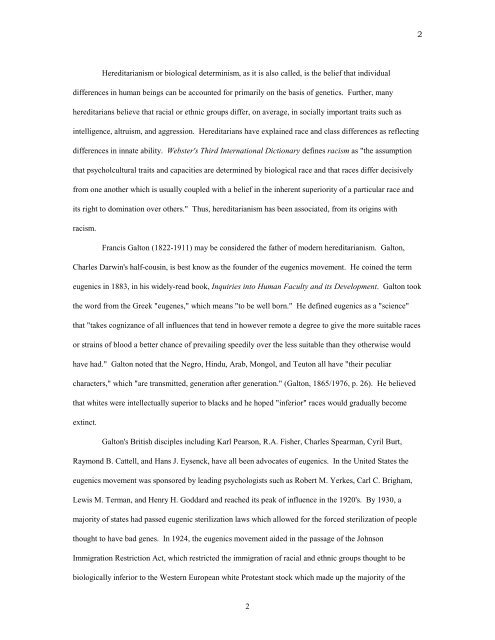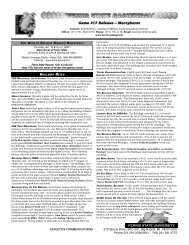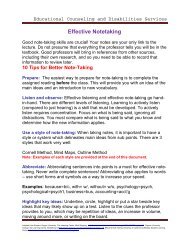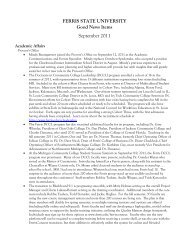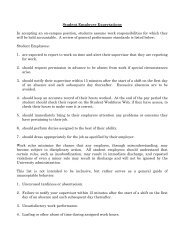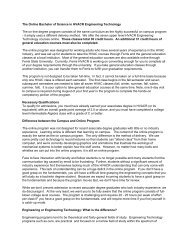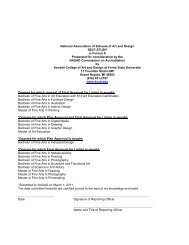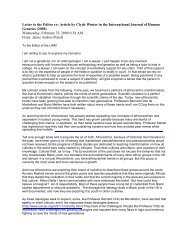MEHLER, Barry. Heredity and Hereditarianism - Ferris State University
MEHLER, Barry. Heredity and Hereditarianism - Ferris State University
MEHLER, Barry. Heredity and Hereditarianism - Ferris State University
Create successful ePaper yourself
Turn your PDF publications into a flip-book with our unique Google optimized e-Paper software.
<strong>Hereditarianism</strong> or biological determinism, as it is also called, is the belief that individual<br />
differences in human beings can be accounted for primarily on the basis of genetics. Further, many<br />
hereditarians believe that racial or ethnic groups differ, on average, in socially important traits such as<br />
intelligence, altruism, <strong>and</strong> aggression. Hereditarians have explained race <strong>and</strong> class differences as reflecting<br />
differences in innate ability. Webster's Third International Dictionary defines racism as "the assumption<br />
that psycholcultural traits <strong>and</strong> capacities are determined by biological race <strong>and</strong> that races differ decisively<br />
from one another which is usually coupled with a belief in the inherent superiority of a particular race <strong>and</strong><br />
its right to domination over others." Thus, hereditarianism has been associated, from its origins with<br />
racism.<br />
Francis Galton (1822-1911) may be considered the father of modern hereditarianism. Galton,<br />
Charles Darwin's half-cousin, is best know as the founder of the eugenics movement. He coined the term<br />
eugenics in 1883, in his widely-read book, Inquiries into Human Faculty <strong>and</strong> its Development. Galton took<br />
the word from the Greek "eugenes," which means "to be well born." He defined eugenics as a "science"<br />
that "takes cognizance of all influences that tend in however remote a degree to give the more suitable races<br />
or strains of blood a better chance of prevailing speedily over the less suitable than they otherwise would<br />
have had." Galton noted that the Negro, Hindu, Arab, Mongol, <strong>and</strong> Teuton all have "their peculiar<br />
characters," which "are transmitted, generation after generation." (Galton, 1865/1976, p. 26). He believed<br />
that whites were intellectually superior to blacks <strong>and</strong> he hoped "inferior" races would gradually become<br />
extinct.<br />
Galton's British disciples including Karl Pearson, R.A. Fisher, Charles Spearman, Cyril Burt,<br />
Raymond B. Cattell, <strong>and</strong> Hans J. Eysenck, have all been advocates of eugenics. In the United <strong>State</strong>s the<br />
eugenics movement was sponsored by leading psychologists such as Robert M. Yerkes, Carl C. Brigham,<br />
Lewis M. Terman, <strong>and</strong> Henry H. Goddard <strong>and</strong> reached its peak of influence in the 1920's. By 1930, a<br />
majority of states had passed eugenic sterilization laws which allowed for the forced sterilization of people<br />
thought to have bad genes. In 1924, the eugenics movement aided in the passage of the Johnson<br />
Immigration Restriction Act, which restricted the immigration of racial <strong>and</strong> ethnic groups thought to be<br />
biologically inferior to the Western European white Protestant stock which made up the majority of the<br />
2<br />
2


